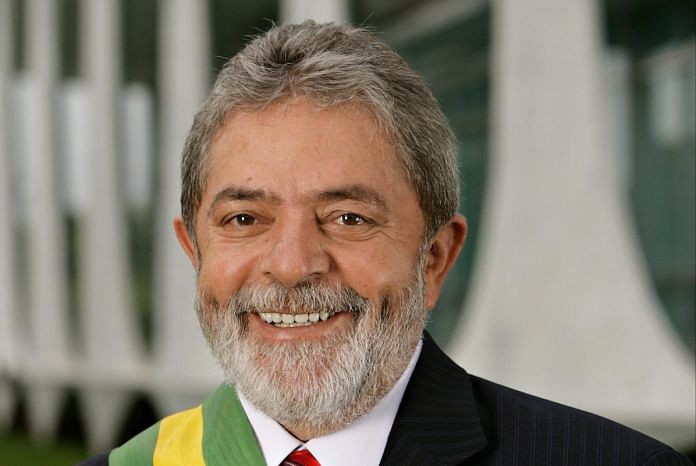Brazil’s top court ruled Thursday that former President Luiz Inácio Lula da Silva will be sent to prison, ruining his plans to return to power. The leaders from Iran, Russia and Turkey met to decide over Syria’s future, and concerns about Trump’s power struggle with China ending in war rise after new tariffs are imposed.
Lula is going to jail
Brazil’s former president Luiz Inácio Lula da Silva will be sent to prison, where he will most likely continue to appeal his corruption conviction, in “an explosive decision that upends the nation’s politics and appears to quash his bid to return to power,” write Ernesto Londono and Shansta Darlington in the New York Times.
“There was more at stake than the legal fate of Mr. da Silva, 72, a towering and divisive figure in Brazilian politics who has a considerable lead in the polls for October’s presidential election.”
“The 6 to 5 ruling against the former president, who has called his prosecution an underhanded ploy to keep him off the ballot, is likely to call into question the legitimacy of the election in the eyes of many Brazilians.”
The country is still getting over Dilma Rousseff’s impeachment in 2016 over charges of manipulating the federal budget to hide the nation’s economic troubles. “Mr. da Silva, who is known commonly as Lula, has been trying to reclaim the presidency. But last July, he was convicted of corruption and money laundering, and sentenced to almost 10 years in prison. In January, an appeals court unanimously upheld the conviction and increased the sentence to 12 years.”
“On Wednesday, the court gave its answer: It decided to maintain the status quo, which holds that defendants can be imprisoned after an appeals court upholds a verdict against them. With the ruling in hand, Sérgio Moro, the federal judge who presided over Mr. da Silva’s trial, is expected to issue an arrest warrant for the former president in a matter of days.”
Syria’s fate rests in the hands of others
Iran, Russia and Turkey met on Wednesday for high-level talks on the Syrian war, “cementing their influence on the outcome of the conflict and isolating the United States from the region’s most crucial diplomacy,” writes Erin Cunningham for the Washington Post.
“The three presidents — Recep Tayyip Erdogan of Turkey, Iran’s Hassan Rouhani and Russia’s Vladimir Putin — gathered in the Turkish capital, Ankara, where they pledged to cooperate on reconstruction and aid. They also vowed to protect Syria’s “territorial integrity,” even as all three nations maintain a military presence inside the country. The leaders called for more support from the international community and emphasized their opposition to “separatist agendas” in Syria.”
The three nations held talks against the backdrop of rising tensions with the United States. The talks were held just a day after Trump announced plans to withdraw Syria, which the White House refuted soon after.
This is the second time that Erdogan, Putin and Rouhani have met in recent months, showing the extent to which US influence in the region has waned.
“If implemented, a U.S. departure would leave a power vacuum in parts of Syria, accelerating an already rapid scramble for influence and territory after seven years of conflict. It would also empower Iran and Russia, both U.S. adversaries and backers of Syrian President Bashar al-Assad, who has clung to power despite the ravages of civil war.”
A literal war, not over trade
“Donald Trump’s declaration of tariff warfare against China has little to do with trade. It is about raw power, a struggle over which of the two sparring hegemons will dominate technology and run the world in the 21st century,” writes Ambrose Evans-Pritchard in the Sydney Morning Herald.
“The pretence of cordial coexistence has all but ended in the Hobbesian era of Trumpism. The latest US national security strategy report for the first time names China as a strategic rival that seeks to “challenge American power, influence and interests, attempting to erode American security and prosperity”. It is the poisonous-diplomatic context that makes this week’s trade skirmish so dangerous.”
The US sanctions entail 25 per cent tariffs (worth $63 billion) on Chinese exports. Beijing’s response was tariffs on 106 product lines. “China and the US are now on a collision course. Trump tweets that “trade wars are good, and easy to win”. He has threatened to match retaliatory sanctions with yet more sanctions in an escalation spiral. President Xi Jinping in turn cannot show weakness. He will respond with equal calibration at every stage, even as he tries to seize the high ground by taking the case to the World Trade Organisation,” writes Evans-Pritchard.
“To expect arguments of rational self-interest to prevail as this saga unfolds is to ignore history. We have moved beyond the realm of homo economicus.”



